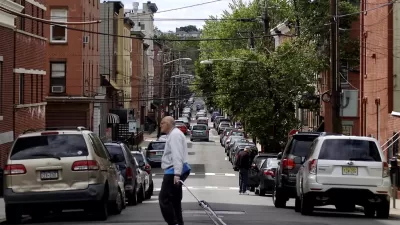With the brilliant help of graduates from Hoboken's Stevens Institute of Technology, our local community shuttle bus (a.k.a. The Hop, formerly known as The Downtown Crosstown Shuttle) can now be viewed live on the city's website as it cruises along narrow Hoboken city streets from 7:00 AM to 7:00 PM (EST), Monday through Friday. If you're not near the internet, try texting “crosstown” to 41411 to get a return text with the location of the bus' whereabouts whenever it's running, then run down to the corner before you miss it!
With the brilliant help of graduates from Hoboken's Stevens Institute of Technology, our local community shuttle bus (a.k.a. The Hop, formerly known as The Downtown Crosstown Shuttle) can now be viewed live on the city's website as it cruises along narrow Hoboken city streets from 7:00 AM to 7:00 PM (EST), Monday through Friday. If you're not near the internet, try texting "crosstown" to 41411 to get a return text with the location of the bus' whereabouts whenever it's running, then run down to the corner before you miss it!

Text "crosstown" to 41411 to find me! (Photo Courtesy of Jerry Lore/h-mag)
This infusion of technology makes our humble bus attractive to smart phone-tethered younger residents impatient (or illiterate) with static bus schedules, and allows us to confirm that the time-honored timetable is nonetheless accurate for older generations who have come to depend on the bus to get around locally. The project pieces, assembled and implemented as a volunteer effort by computer-omniscient start-up group gurus at www.parkingmapper.com, totaled less than $500 in materials and about eight weeks of catch-as-catch-can time; they might pimp your ride too if you ask nice!
The technology rivals other surprisingly expensive systems and speaks to the heart of what partnerships between local universities and municipalities are all about. Open sources such as Linux and OpenStreetMap.org were leveraged to provide needed code guts at no additional cost. Residents graduate in days from perceiving this as a fun toy to using it as a de rigueuer tool for making the best use of their time (just as how one finally stops staring at the Roomba vacuum cleaner after a few hours and gets on with life sans sweeping). Minimalists can debate whether a paper schedule in pocket (or in head) is less inconvenient than a text message from the ether; in terms of exploring ways to use ubiquitous technologies to simplify life, this is a success! As Edie Brickell says, "...religion, is the smile on a dog."

Manufactured Crisis: Losing the Nation’s Largest Source of Unsubsidized Affordable Housing
Manufactured housing communities have long been an affordable housing option for millions of people living in the U.S., but that affordability is disappearing rapidly. How did we get here?

Americans May Be Stuck — But Why?
Americans are moving a lot less than they once did, and that is a problem. While Yoni Applebaum, in his highly-publicized article Stuck, gets the reasons badly wrong, it's still important to ask: why are we moving so much less than before?

Research Shows More Roads = More Driving
A national study shows, once again, that increasing road supply induces additional vehicle travel, particularly over the long run.

Judge Halts Enforcement of Anti-Homeless Laws in Grants Pass
The Oregon city will be barred from enforcing two ordinances that prosecute unhoused residents until it increases capacity and accessibility at designated camping sites.

Advancing Sustainability in Los Angeles County Schools
The Los Angeles County Office of Education’s Green Schools Symposium brings together educators, students, and experts to advance sustainability in schools through innovative design, climate resilience strategies, and collaborative learning.

Using Old Oil and Gas Wells for Green Energy Storage
Penn State researchers have found that repurposing abandoned oil and gas wells for geothermal-assisted compressed-air energy storage can boost efficiency, reduce environmental risks, and support clean energy and job transitions.
Urban Design for Planners 1: Software Tools
This six-course series explores essential urban design concepts using open source software and equips planners with the tools they need to participate fully in the urban design process.
Planning for Universal Design
Learn the tools for implementing Universal Design in planning regulations.
City of Moreno Valley
Institute for Housing and Urban Development Studies (IHS)
City of Grandview
Harvard GSD Executive Education
NYU Wagner Graduate School of Public Service
City of Cambridge, Maryland
Newport County Development Council: Connect Greater Newport




























